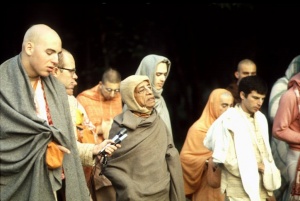SB 4.28.16: Difference between revisions
m (1 revision(s)) |
(Vanibot #0054 edit - transform synonyms into clickable links, which search similar occurrences) |
||
| (One intermediate revision by one other user not shown) | |||
| Line 1: | Line 1: | ||
{{info | {{info | ||
|speaker= | |speaker=Nārada Muni | ||
|listener=King | |listener=King Prācīnabarhiṣat | ||
}} | }} | ||
[[Category:Srimad-Bhagavatam - Canto 04 Chapter 28]] | |||
[[Category:Bhagavatam Verses Spoken by Narada Muni - Vanisource|042816]] | |||
<div style="float:left">'''[[Srimad-Bhagavatam]] - [[SB 4|Fourth Canto]] - [[SB 4.28: Puranjana Becomes a Woman in the Next Life|Chapter 28: Purañjana Becomes a Woman in the Next Life]]'''</div> | |||
<div style="float:right">[[File:Go-previous.png|link=SB 4.28.15]] '''[[SB 4.28.15]] - [[SB 4.28.17]]''' [[File:Go-next.png|link=SB 4.28.17]]</div> | |||
{{RandomImage}} | |||
==== TEXT 16 ==== | ==== TEXT 16 ==== | ||
<div | <div class="verse"> | ||
duhitṟḥ putra-pautrāṁś ca | :duhitṟḥ putra-pautrāṁś ca | ||
jāmi-jāmātṛ-pārṣadān | :jāmi-jāmātṛ-pārṣadān | ||
svatvāvaśiṣṭaṁ yat kiñcid | :svatvāvaśiṣṭaṁ yat kiñcid | ||
gṛha-kośa-paricchadam | :gṛha-kośa-paricchadam | ||
</div> | </div> | ||
| Line 16: | Line 22: | ||
==== SYNONYMS ==== | ==== SYNONYMS ==== | ||
<div | <div class="synonyms"> | ||
''[//vanipedia.org/wiki/Special:VaniSearch?s=duhitṟḥ&tab=syno_o&ds=1 duhitṟḥ]'' — daughters; ''[//vanipedia.org/wiki/Special:VaniSearch?s=putra&tab=syno_o&ds=1 putra]'' — sons; ''[//vanipedia.org/wiki/Special:VaniSearch?s=pautrān&tab=syno_o&ds=1 pautrān]'' — grandsons; ''[//vanipedia.org/wiki/Special:VaniSearch?s=ca&tab=syno_o&ds=1 ca]'' — and; ''[//vanipedia.org/wiki/Special:VaniSearch?s=jāmi&tab=syno_o&ds=1 jāmi]'' — daughters-in-law; ''[//vanipedia.org/wiki/Special:VaniSearch?s=jāmātṛ&tab=syno_o&ds=1 jāmātṛ]'' — sons-in-law; ''[//vanipedia.org/wiki/Special:VaniSearch?s=pārṣadān&tab=syno_o&ds=1 pārṣadān]'' — associates; ''[//vanipedia.org/wiki/Special:VaniSearch?s=svatva&tab=syno_o&ds=1 svatva]'' — property; ''[//vanipedia.org/wiki/Special:VaniSearch?s=avaśiṣṭam&tab=syno_o&ds=1 avaśiṣṭam]'' — remaining; ''[//vanipedia.org/wiki/Special:VaniSearch?s=yat&tab=syno_o&ds=1 yat] [//vanipedia.org/wiki/Special:VaniSearch?s=kiñcit&tab=syno_o&ds=1 kiñcit]'' — whatever; ''[//vanipedia.org/wiki/Special:VaniSearch?s=gṛha&tab=syno_o&ds=1 gṛha]'' — home; ''[//vanipedia.org/wiki/Special:VaniSearch?s=kośa&tab=syno_o&ds=1 kośa]'' — accumulation of wealth; ''[//vanipedia.org/wiki/Special:VaniSearch?s=paricchadam&tab=syno_o&ds=1 paricchadam]'' — household paraphernalia. | |||
</div> | </div> | ||
| Line 23: | Line 29: | ||
==== TRANSLATION ==== | ==== TRANSLATION ==== | ||
<div | <div class="translation"> | ||
King Purañjana then began to think of his daughters, sons, grandsons, daughters-in-law, sons-in-law, servants and other associates as well as his house, his household paraphernalia and his little accumulation of wealth. | King Purañjana then began to think of his daughters, sons, grandsons, daughters-in-law, sons-in-law, servants and other associates as well as his house, his household paraphernalia and his little accumulation of wealth. | ||
</div> | </div> | ||
| Line 30: | Line 36: | ||
==== PURPORT ==== | ==== PURPORT ==== | ||
<div | <div class="purport"> | ||
It is not infrequent for a person overly attached to the material body to request a physician to prolong his life at least for some time. If the so-called scientific physician is able to prolong one's life for a few minutes through the use of oxygen or other medicines, he thinks that he is very successful in his attempts, although ultimately the patient will die. This is called the struggle for existence. At the time of death both patient and physician still think of prolonging life, although all the constituents of the body are practically dead and gone. | It is not infrequent for a person overly attached to the material body to request a physician to prolong his life at least for some time. If the so-called scientific physician is able to prolong one's life for a few minutes through the use of oxygen or other medicines, he thinks that he is very successful in his attempts, although ultimately the patient will die. This is called the struggle for existence. At the time of death both patient and physician still think of prolonging life, although all the constituents of the body are practically dead and gone. | ||
</div> | </div> | ||
__NOTOC__ | |||
<div style="float:right; clear:both;">[[File:Go-previous.png|link=SB 4.28.15]] '''[[SB 4.28.15]] - [[SB 4.28.17]]''' [[File:Go-next.png|link=SB 4.28.17]]</div> | |||
__NOTOC__ | |||
__NOEDITSECTION__ | |||
Latest revision as of 21:43, 18 February 2024

A.C. Bhaktivedanta Swami Prabhupada
TEXT 16
- duhitṟḥ putra-pautrāṁś ca
- jāmi-jāmātṛ-pārṣadān
- svatvāvaśiṣṭaṁ yat kiñcid
- gṛha-kośa-paricchadam
SYNONYMS
duhitṟḥ — daughters; putra — sons; pautrān — grandsons; ca — and; jāmi — daughters-in-law; jāmātṛ — sons-in-law; pārṣadān — associates; svatva — property; avaśiṣṭam — remaining; yat kiñcit — whatever; gṛha — home; kośa — accumulation of wealth; paricchadam — household paraphernalia.
TRANSLATION
King Purañjana then began to think of his daughters, sons, grandsons, daughters-in-law, sons-in-law, servants and other associates as well as his house, his household paraphernalia and his little accumulation of wealth.
PURPORT
It is not infrequent for a person overly attached to the material body to request a physician to prolong his life at least for some time. If the so-called scientific physician is able to prolong one's life for a few minutes through the use of oxygen or other medicines, he thinks that he is very successful in his attempts, although ultimately the patient will die. This is called the struggle for existence. At the time of death both patient and physician still think of prolonging life, although all the constituents of the body are practically dead and gone.